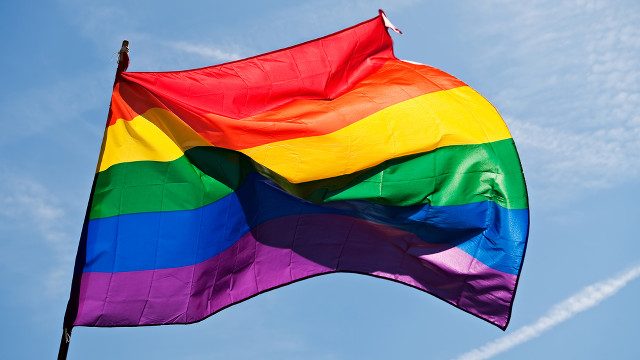SUMMARY
This is AI generated summarization, which may have errors. For context, always refer to the full article.

BERLIN, Germany (UPDATED) – Two German men made history Sunday, October 1, by saying “I do” and becoming the first same-sex couple to marry after decades of struggle, but campaigners say the battle for equal rights isn’t over.
Wedding bells rang out in Berlin, Hamburg, Hanover, and other German cities where local authorities have exceptionally opened their doors on a Sunday, allowing weddings on the day the law comes into effect.
Bodo Mende, 60, and partner Karl Kreile, 59, exchanged their vows at a desk decked out with white flowers and rainbow flags.
Then, they turned to offer a shot of their first embrace as a married couple to the throng of photographers and TV crews from around the world who packed the south Berlin registry office alongside friends and family.
“I’m unbelievably satisfied, this is extremely symbolic to be recognized as a completely normal couple and no longer to have a second-class marriage,” Kreile said after the two cut a slice of rainbow cake.
Mende and Kreile, longtime gay marriage campaigners who have been together since 1979, wanted to tie the knot as soon as possible – after being among the first to enter a civil partnership back in 2002.
The dash to exchange vows comes 3 months after lawmakers voted to give Germany’s roughly 94,000 same-sex couples the right to marry, following a shift in position by Chancellor Angela Merkel. (READ: Germany legalizes same-sex marriage, Merkel votes against)
“Finally, equal law for equal love,” tweeted Justice Minister Heiko Maas, as Germany became the 15th European nation to legalize gay marriage.
The Netherlands led the way in 2000, followed piecemeal by other European countries including Spain, Sweden, Britain, and France.
Same-sex relationships have become so normalized that polls show around 75% of Germans are in favour of gay marriage.
“It’s a marvelous day. We’re all feeling festive and happy,” lawmaker and Social Democratic Party (SPD) gay and lesbian affairs commissioner Johannes Kahrs told Agence France-Presse from Hamburg, where he was best man at the wedding of two friends.
“But we would gladly have had it sooner. Thank you for nothing, Frau Merkel,” he added, the reproach he flung at Merkel in a stormy speech in parliament when the law was passed.
Merkel’s change of heart
By extending existing law to same-sex pairs, Germany’s gay couples automatically gain the same tax advantages and adoption rights as heterosexual families.
Along with Germany’s Greens party, the gay and lesbian rights organization LSVD began its battle for equal marriage rights around the year 1990.
But progress was slow and since 2001 gay couples have had to make do with a civil partnership law, broadened over the years to remove more and more gaps between gay and straight couples’ rights.
The final breakthrough came quite suddenly in the end, sparked by Merkel’s unexpected announcement in June that she would allow her conservative MPs to vote their conscience on the issue.
Merkel said her thinking changed after a “memorable experience” when she met a lesbian couple who lovingly care for 8 foster children in her Baltic coast constituency.
Her surprise shift in position – after 12 years of blockade by her Christian Democrats and their Bavarian allies – was seen by some as a cynical ploy to rob her challengers of a popular cause ahead of September’s general election.
The chancellor herself voted against the bill, arguing that the German constitution still defines marriage as “the union of a man and a woman.”
June was a memorable month for gay rights in Germany, as lawmakers also voted to quash the convictions of thousands of men convicted under a Nazi-era law against same-sex relationships which had remained on the statute book until 1994.
But there are still an array of issues familiar across Western democracies, like blood donations or access to reproductive medicine, where homosexuals can be treated differently.
And the constitution must still be amended to fully protect against discrimination over gender or sexual orientation, Kahrs said.
“These are all things that we’ll tackle bit by bit,” he said. “The important thing is that we’ve pushed through the opening of marriage, and that’s the signal everyone needed.” – Rappler.com
Add a comment
How does this make you feel?
There are no comments yet. Add your comment to start the conversation.